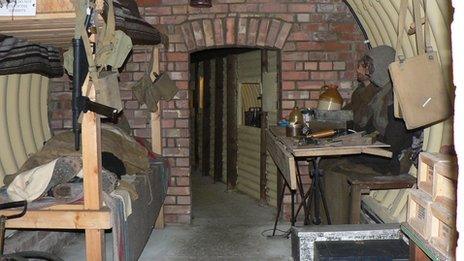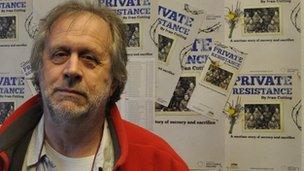World War II resistance units inspire Eastern Angles play
- Published

Parham Airfield Museum, Suffolk has a recreated underground bunker
The story of 100 war-time bunkers across East Anglia has inspired a play by the regional theatre company Eastern Angles.
Auxiliary units were set up to hide underground and carry out resistance fighting in the event of a German invasion in World War II.
The play, called Private Resistance, is being staged at dozens of venues until 20 May.
The final venue is Parham Airfield Museum, Suffolk.
The auxiliary units, which formed the British Resistance Organisation, contained about six men who were expected to carry out acts of sabotage all along the east coast of the UK.
They would remain behind enemy lines and, if the invasion was not repelled, they were expected to be operational for about two weeks before it was assumed they would be discovered.
'Technically illegal'
John Warwicker, author of Churchill's Underground Army, said: "Winston Churchill [the British Prime Minister] didn't actually invent the auxiliary units, but after Dunkirk [the 1940 retreat from France], he gave the authority for the creation of this civilian army.
"Technically it was illegal to arm civilians, was contrary to the conventions of war, but that was the stratagem for the survival of the country.
"Had these men been captured by the Germans, they would have had no rights as prisoners of war - they could have been interrogated brutally and executed.
"If they became active and reprisals were carried out against their families, they were told to carry on with their duties as saboteurs."
The late Roger Weeley was interviewed in 1986 about his bunker at Weeley, Essex by Eastern Angles' artistic director Ivan Cutting.
Mr Weeley, who was a farmer, said: "[We] had to be ready to disappear, harass any lines if there was a landing, harass lines of communication and take any opportunity of killing a German silently, quietly and not being noticed.
"My feeling was that when you got to the stage when they [the Germans] were here, you had to try and keep yourself alive as long as you could because you're no good at all dead.
"If we couldn't get rid of them after the first three or four days, I don't think we ever could have done."

Ivan Cutting aimed to question the idea of resistance in his play
Resistance questioned
Mr Cutting did his interview while researching another play about the home front and kept the resistance movement idea on the back burner until now.
"The theme of the play is the invasion and what would have happened," he said.
"I began to get interested in the effects of having to attack the Germans from behind the lines, especially as we found out more about what happened to the French resistance.
"I think [the resistance] would have worked to start off with, but there would have been terrible reprisals from the Germans such that it's possible the local population might have turned against their own men.
"It just questions the idea of resistance and it's a grey area with that odd feeling that you are fighting on your own doorstep."
The final venue for the tour is the Parham Airfield Museum which has a recreation of an underground bunker, although this one is actually above ground.
- Published30 March 2011